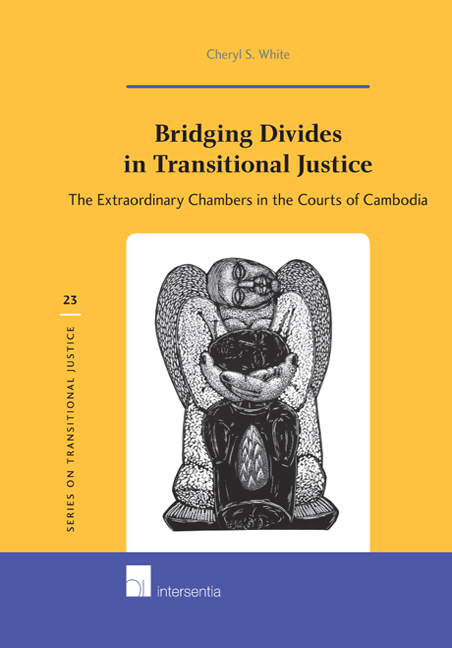Book contents
- Frontmatter
- Acknowledgements
- Contents
- Table of Cases
- Table of Legislation
- Table of Treaties
- List of Abbreviations
- Chapter 1 Introduction
- Chapter 2 Trials in Transitional Justice Theory
- Chapter 3 The Development of the Transitional Trial
- Chapter 4 The Creation of the Extraordinary Chambers in the Courts of Cambodia
- Chapter 5 Inquisitorial Criminal Procedure at the ECCC
- Chapter 6 Trial Dialogue in Case 001
- Chapter 7 The Voice of the Victim
- Chapter 8 The Voice of the Court in Judgment: Case 001
- Chapter 9 Conclusion
- Bibliography
- Index
- About the Author
Chapter 8 - The Voice of the Court in Judgment: Case 001
Published online by Cambridge University Press: 27 September 2018
- Frontmatter
- Acknowledgements
- Contents
- Table of Cases
- Table of Legislation
- Table of Treaties
- List of Abbreviations
- Chapter 1 Introduction
- Chapter 2 Trials in Transitional Justice Theory
- Chapter 3 The Development of the Transitional Trial
- Chapter 4 The Creation of the Extraordinary Chambers in the Courts of Cambodia
- Chapter 5 Inquisitorial Criminal Procedure at the ECCC
- Chapter 6 Trial Dialogue in Case 001
- Chapter 7 The Voice of the Victim
- Chapter 8 The Voice of the Court in Judgment: Case 001
- Chapter 9 Conclusion
- Bibliography
- Index
- About the Author
Summary
INTRODUCTION
Examining the process of judgment involves analysis of how the judiciary navigated the fault-lines of the trial, interpreted its narratives, and applied the relevant law. Drawing from Osiel's view of transitional courts as capable of accommodating divergent views of past violence, in this chapter, the ECCC's judgments are examined as sites where the social meaning of the trial was fleshed out within an internationalised legal framework. While the voice of the Court through its judgments is in a formal register, it is nonetheless a response to the dialogue of trial proceedings. The judgments also reflect the multiple levels on which transitional trials play out: legal and political, doctrinal and historical.
The chapter highlights the communicative and expressive aspects of the process of judgment at the ECCC in both the Trial Chamber and the Supreme Court Chamber in Case 001. It examines the process of judgment by consideration of issues with social or political resonance in Cambodia, and to some extent in the international sphere. The chapter is structured around the grounds of appeal following the Trial Chamber finding of Duch's guilt for grave breaches of the Geneva Conventions and crimes against humanity, and its order of a fixed-term sentence. In addressing the grounds of appeal, the ECCC Supreme Court Chamber (SCC) interrogated the personal jurisdiction of the ECCC, interpreted the relevant international norms and reviewed the sentence imposed by the Trial Chamber. The SCC also ruled on appeals against the Trial Chamber's rejection of a number of civil party applications and the Trial Chamber's reparations award.
PERSONAL JURISDICTION
In Chapters four and five, sections 4.5.4 and 5.4.3, I discussed the Cambodian government's opposition to the ECCC's opening of the investigations into Cases 003 and 004. The cases concerned former Khmer Rouge officials suspected as some of those most responsible for crimes within the jurisdiction of the ECCC, but who were not senior leaders of the regime. The government's resistance to expanding the net of prosecution highlighted the politically contentious nature of the ECCC's personal jurisdiction.
- Type
- Chapter
- Information
- Bridging Divides in Transitional JusticeThe Extraordinary Chambers in the Courts of Cambodia, pp. 241 - 270Publisher: IntersentiaPrint publication year: 2017

